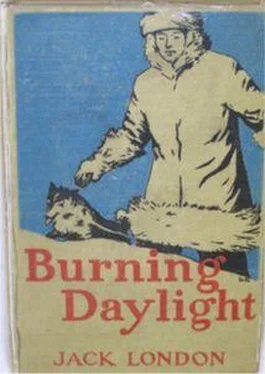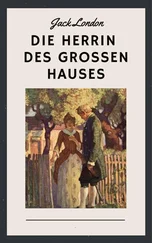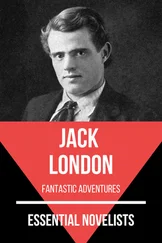Jack London - Burning Daylight
Здесь есть возможность читать онлайн «Jack London - Burning Daylight» весь текст электронной книги совершенно бесплатно (целиком полную версию без сокращений). В некоторых случаях можно слушать аудио, скачать через торрент в формате fb2 и присутствует краткое содержание. Год выпуска: 1910, Жанр: Классическая проза, Природа и животные, Путешествия и география, на английском языке. Описание произведения, (предисловие) а так же отзывы посетителей доступны на портале библиотеки ЛибКат.
- Название:Burning Daylight
- Автор:
- Жанр:
- Год:1910
- ISBN:нет данных
- Рейтинг книги:5 / 5. Голосов: 1
-
Избранное:Добавить в избранное
- Отзывы:
-
Ваша оценка:
- 100
- 1
- 2
- 3
- 4
- 5
Burning Daylight: краткое содержание, описание и аннотация
Предлагаем к чтению аннотацию, описание, краткое содержание или предисловие (зависит от того, что написал сам автор книги «Burning Daylight»). Если вы не нашли необходимую информацию о книге — напишите в комментариях, мы постараемся отыскать её.
Burning Daylight — читать онлайн бесплатно полную книгу (весь текст) целиком
Ниже представлен текст книги, разбитый по страницам. Система сохранения места последней прочитанной страницы, позволяет с удобством читать онлайн бесплатно книгу «Burning Daylight», без необходимости каждый раз заново искать на чём Вы остановились. Поставьте закладку, и сможете в любой момент перейти на страницу, на которой закончили чтение.
Интервал:
Закладка:
In the meantime, and from the day he washed seven hundred dollars from a single pan and squatted over it and thought a long thought, he never again touched hand to pick and shovel. As he said to Joe Ladue the night of that wonderful washing:—
"Joe, I ain't never going to work hard again. Here's where I begin to use my brains. I'm going to farm gold. Gold will grow gold if you-all have the savvee and can get hold of some for seed. When I seen them seven hundred dollars in the bottom of the pan, I knew I had the seed at last."
"Where are you going to plant it?" Joe Ladue had asked.
And Daylight, with a wave of his hand, definitely indicated the whole landscape and the creeks that lay beyond the divides.
"There she is," he said, "and you-all just watch my smoke. There's millions here for the man who can see them. And I seen all them millions this afternoon when them seven hundred dollars peeped up at me from the bottom of the pan and chirruped, 'Well, if here ain't Burning Daylight come at last.'"
CHAPTER XI
The hero of the Yukon in the younger days before the Carmack strike, Burning Daylight now became the hero of the strike. The story of his hunch and how he rode it was told up and down the land. Certainly he had ridden it far and away beyond the boldest, for no five of the luckiest held the value in claims that he held. And, furthermore, he was still riding the hunch, and with no diminution of daring. The wise ones shook their heads and prophesied that he would lose every ounce he had won. He was speculating, they contended, as if the whole country was made of gold, and no man could win who played a placer strike in that fashion.
On the other hand, his holdings were reckoned as worth millions, and there were men so sanguine that they held the man a fool who coppered [6] To copper: a term in faro, meaning to play a card to lose.
any bet Daylight laid. Behind his magnificent free-handedness and careless disregard for money were hard, practical judgment, imagination and vision, and the daring of the big gambler. He foresaw what with his own eyes he had never seen, and he played to win much or lose all.
"There's too much gold here in Bonanza to be just a pocket," he argued. "It's sure come from a mother-lode somewhere, and other creeks will show up. You-all keep your eyes on Indian River. The creeks that drain that side the Klondike watershed are just as likely to have gold as the creeks that drain this side."
And he backed this opinion to the extent of grub-staking half a dozen parties of prospectors across the big divide into the Indian River region. Other men, themselves failing to stake on lucky creeks, he put to work on his Bonanza claims. And he paid them well—sixteen dollars a day for an eight-hour shift, and he ran three shifts. He had grub to start them on, and when, on the last water, the Bella arrived loaded with provisions, he traded a warehouse site to Jack Kearns for a supply of grub that lasted all his men through the winter of 1896. And that winter, when famine pinched, and flour sold for two dollars a pound, he kept three shifts of men at work on all four of the Bonanza claims. Other mine-owners paid fifteen dollars a day to their men; but he had been the first to put men to work, and from the first he paid them a full ounce a day. One result was that his were picked men, and they more than earned their higher pay.
One of his wildest plays took place in the early winter after the freeze-up. Hundreds of stampeders, after staking on other creeks than Bonanza, had gone on disgruntled down river to Forty Mile and Circle City. Daylight mortgaged one of his Bonanza dumps with the Alaska Commercial Company, and tucked a letter of credit into his pouch. Then he harnessed his dogs and went down on the ice at a pace that only he could travel. One Indian down, another Indian back, and four teams of dogs was his record. And at Forty Mile and Circle City he bought claims by the score. Many of these were to prove utterly worthless, but some few of them were to show up more astoundingly than any on Bonanza. He bought right and left, paying as low as fifty dollars and as high as five thousand. This highest one he bought in the Tivoli Saloon. It was an upper claim on Eldorado, and when he agreed to the price, Jacob Wilkins, an old-timer just returned from a look at the moose-pasture, got up and left the room, saying:—
"Daylight, I've known you seven year, and you've always seemed sensible till now. And now you're just letting them rob you right and left. That's what it is—robbery. Five thousand for a claim on that damned moose-pasture is bunco. I just can't stay in the room and see you buncoed that way."
"I tell you-all," Daylight answered, "Wilkins, Carmack's strike's so big that we-all can't see it all. It's a lottery. Every claim I buy is a ticket. And there's sure going to be some capital prizes."
Jacob Wilkins, standing in the open door, sniffed incredulously.
"Now supposing, Wilkins," Daylight went on, "supposing you-all knew it was going to rain soup. What'd you-all do? Buy spoons, of course. Well, I'm sure buying spoons. She's going to rain soup up there on the Klondike, and them that has forks won't be catching none of it."
But Wilkins here slammed the door behind him, and Daylight broke off to finish the purchase of the claim.
Back in Dawson, though he remained true to his word and never touched hand to pick and shovel, he worked as hard as ever in his life. He had a thousand irons in the fire, and they kept him busy. Representation work was expensive, and he was compelled to travel often over the various creeks in order to decide which claims should lapse and which should be retained. A quartz miner himself in his early youth, before coming to Alaska, he dreamed of finding the mother-lode. A placer camp he knew was ephemeral, while a quartz camp abided, and he kept a score of men in the quest for months. The mother-lode was never found, and, years afterward, he estimated that the search for it had cost him fifty thousand dollars.
But he was playing big. Heavy as were his expenses, he won more heavily. He took lays, bought half shares, shared with the men he grub-staked, and made personal locations. Day and night his dogs were ready, and he owned the fastest teams; so that when a stampede to a new discovery was on, it was Burning Daylight to the fore through the longest, coldest nights till he blazed his stakes next to Discovery. In one way or another (to say nothing of the many worthless creeks) he came into possession of properties on the good creeks, such as Sulphur, Dominion, Excelsis, Siwash, Cristo, Alhambra, and Doolittle. The thousands he poured out flowed back in tens of thousands. Forty Mile men told the story of his two tons of flour, and made calculations of what it had returned him that ranged from half a million to a million. One thing was known beyond all doubt, namely, that the half share in the first Eldorado claim, bought by him for a half sack of flour, was worth five hundred thousand. On the other hand, it was told that when Freda, the dancer, arrived from over the passes in a Peterborough canoe in the midst of a drive of mush-ice on the Yukon, and when she offered a thousand dollars for ten sacks and could find no sellers, he sent the flour to her as a present without ever seeing her. In the same way ten sacks were sent to the lone Catholic priest who was starting the first hospital.
His generosity was lavish. Others called it insane. At a time when, riding his hunch, he was getting half a million for half a sack of flour, it was nothing less than insanity to give twenty whole sacks to a dancing-girl and a priest. But it was his way. Money was only a marker. It was the game that counted with him. The possession of millions made little change in him, except that he played the game more passionately. Temperate as he had always been, save on rare occasions, now that he had the wherewithal for unlimited drinks and had daily access to them, he drank even less. The most radical change lay in that, except when on trail, he no longer did his own cooking. A broken-down miner lived in his log cabin with him and now cooked for him. But it was the same food: bacon, beans, flour, prunes, dried fruits, and rice. He still dressed as formerly: overalls, German socks, moccasins, flannel shirt, fur cap, and blanket coat. He did not take up with cigars, which cost, the cheapest, from half a dollar to a dollar each. The same Bull Durham and brown-paper cigarette, hand-rolled, contented him. It was true that he kept more dogs, and paid enormous prices for them. They were not a luxury, but a matter of business. He needed speed in his travelling and stampeding. And by the same token, he hired a cook. He was too busy to cook for himself, that was all. It was poor business, playing for millions, to spend time building fires and boiling water.
Читать дальшеИнтервал:
Закладка:
Похожие книги на «Burning Daylight»
Представляем Вашему вниманию похожие книги на «Burning Daylight» списком для выбора. Мы отобрали схожую по названию и смыслу литературу в надежде предоставить читателям больше вариантов отыскать новые, интересные, ещё непрочитанные произведения.
Обсуждение, отзывы о книге «Burning Daylight» и просто собственные мнения читателей. Оставьте ваши комментарии, напишите, что Вы думаете о произведении, его смысле или главных героях. Укажите что конкретно понравилось, а что нет, и почему Вы так считаете.












